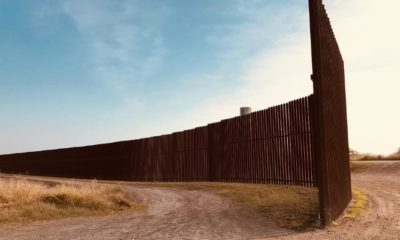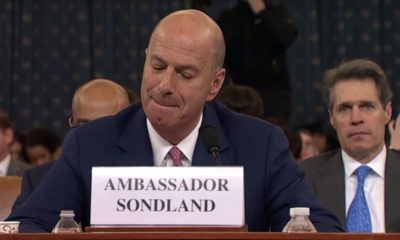Immigration
How Trump’s Immigration Policies Could Yield New Era in Border Politics

The announcement last week that President Donald Trump and the White House were considering shifting billions of dollars more in military funding in addition to the $6 billion already taken from the Pentagon's budget to build Trump's “big, beautiful wall” along the U.S.-Mexico border triggered the usual responses from Democrats, who said it would hurt military readiness, and from Republicans, who said Trump was beefing up U.S. security.But what if a new era has emerged at the border that makes much of the current sniping less relevant than it used to be? That's the provocative question raised by Alan Bersin, who was border czar under President Barack Obama, in a meeting with the San Diego Union-Tribune editorial board.
Bersin made it clear that he considers Trump a corrosive figure who is taking a toll on democracy. But he believes that Trump's administration — after years of bumbling — has figured out how to deter the unlawful migration from Central America that has “broken” the U.S. asylum system.
By exerting economic pressure on Mexico — which sells about 80% of its exports to America — U.S. officials got the Mexican government to sharply ramp up enforcement of its southern border last year, limiting “caravans” that drew thousands of asylum seekers from Guatemala, Honduras and El Salvador across Mexico to the border. Mexico also accepted Trump's new Remain in Mexico program, under which asylum seekers are no longer allowed into the United States while awaiting hearings.
Editorial: How Trump's immigration policies could yield new era in border politics https://t.co/hlsqi2J0Do [Opinion] pic.twitter.com/EfdutTaN39
— The San Diego Union-Tribune (@sdut) January 18, 2020
As of October, there was a backlog of 476,000 asylum cases that took an average of 816 days to resolve — meaning that before Remain in Mexico, asylum seekers could expect a year or two or more to find jobs, blend into their communities, and decide whether to skip their hearings and take their chances as unauthorized immigrants in a nation in which internal enforcement is uneven and in some places rare. Given that in fiscal 2018, asylum was granted in only 16% of completed cases, such a decision is logical for those desperate to live in a safer, richer country. In Bersin's view, what Trump has done has fixed a “huge glitch” in immigration policy — a game-changer that sharply weakens the case for a border wall and an expanded Border Patrol.
The extraordinary cruelty of the Trump administration‘s initial policy of systematically separating families at the border will forever cloud the opinions of millions of Americans when it comes to the president and immigration. And the idea that the United States should discourage asylum-seekers is anathema to those on the left, some of whom have backed a virtual end to immigration enforcement. Moreover, the fact that asylum requests are now being approved at microscopic rates is properly seen as bad faith on the part of a nation that used to be proud of its willingness to accept and help huddled masses.
But the vast decline in arrests for illegal crossing of the southwest border since May, when 132,000 arrests marked a 13-year high, to just under 33,000 arrests in December could create an opportunity for constructive change. “We don't have a border security problem,” Bersin said. “We have a migration management problem.” If this remains the norm, progress becomes more likely on several fronts — from the status of the Deferred Action for Childhood Arrivals program to, yes, creating a path to citizenship for unauthorized immigrants who have led productive, positive lives. Border stability could also help America in another profound way: by limiting the ugly appeal of xenophobic demagoguery.
Is this hope naive? Maybe. Time will tell. But, thankfully, it's within the realm of possibility.
© Copyright 2020 Burlington County Times, 4284 U.S. Route 130 Willingboro, NJ.












